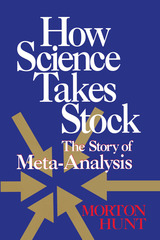3 books about Meta-analysis

The Future of Meta-Analysis
Kenneth W. Wachter
Russell Sage Foundation, 1990
Scientific progress often begins with the difficult task of preparing informed, conclusive reviews of existing research. Since the 1970s, the traditional "subjective" approach to research reviewing in the social sciences has been challenged by a statistical alternative known as meta-analysis. Meta-analysis provides a principled method of distilling reliable generalizations from previous studies on a single topic, thereby providing a quantitative and objective background for future research. The Future of Meta-Analysis brings together expert researchers for an in-depth examination of this new methodology—not to promote a consensus view but rather to explore from several perspectives the theories, tensions, and concerns of meta-analysis, and to illustrate through concrete examples the rationale behind meta-analytic decisions. In a meta-analysis prepared especially for this volume, a statistician and a psychologist review the existing literature on aphasia treatment. In a second study, experts analyze six still-unpublished meta-analyses sponsored by the National Institute of Education to investigate the effects of school desegregation on the academic achievement of black children. This unique case study approach provides valuable discussion of the process of meta-analysis and of the current implications of meta-analysis for policy assessment. Prepared under the auspices of the National Research Council, The Future of Meta-Analysis presents a forum for leaders in this rapidly evolving field to discuss salient conceptual and technical issues and to offer a new theoretical framework, further methodological guidance, and statistical innovations that anticipate a future in which meta-analysis will play an even more effective and valuable role in social science research.
[more]

How Science Takes Stock
The Story of Meta-Analysis
Morton Hunt
Russell Sage Foundation, 1997
Policymakers, medical practitioners, and the public alike face an increasingly bewildering flood of new and often contradictory scientific studies on almost every topic. Whether the issue is the the best treatment for breast cancer, the need for prenatal food programs to improve the health of poor infants and mothers, or the ability of women to succeed in scientific professions, the healthy growth of modern science has at times done more to stir up controversy than to establish reliable knowledge. But now scientists in several fields have developed a sophisticated new methodology called meta-analysis to address this problem. By numerically combining diverse research findings on a single question, meta-analysis can be used to identify their central tendency and reach conclusions far more reliable than those of any single investigation. How Science Takes Stock vividly tells the story of meta-analysis through the eyes of its architects and champions, and chronicles its history, techniques, achievements, and controversies. Noted science author Morton Hunt visits key practitioners and recounts their use of meta-analysis to resolve important scientific puzzles and longstanding debates. Does psychotherapy work, and if so what form works best? Does spending federal money on education really improve student performance? Can a single enzyme significantly decrease the risk of heart attack? Do boot camps reduce juvenile delinquency? With each account, Hunt illustrates the major components of the meta-analytic method, reveals strategies for resolving practical and theoretical problems, and discusses the impact of meta-analysis on the science and policy communities. In many cases, he demonstrates how meta-analysts have gone a step further to determine the causes of earlier discrepancies. In this way they not only identify successful approaches to the question at hand, but also clarify the conditions under which they will work best. Hunt also portrays the important but frequently controversial business of doing meta-analysis for legislators and government agencies, particularly in sensitive areas of social policy. How Science Takes Stock demonstrates how the statistical techniques of meta-analysis produce more accurate data than the standard literature review or the old-fashioned process of tallying up the results of each scientific study as if they were votes in an election to decide the truth. Hunt also addresses issues of quality control in each phase of the meta-analytic process, and answers skeptics who claim that the dissimilarities between studies are often too significant for meta-analysis to be any more than an apples and oranges approach. This volume conveys the power of meta-analysis to help social policymakers and health professionals resolve their most pressing problems. How Science Takes Stock concludes with a discussion of the future of meta-analysis that examines its potential for further refinements, its growth in the scientific literature, and exciting new possibilities for its future use. An appendix by meta-analysis expert Harris Cooper offers some finer points on the mechanics of conducting a meta-analytic investigation.
[more]

Meta-Analysis for Explanation
A Casebook
Thomas D. Cook
Russell Sage Foundation, 1992
Social science research often yields conflicting results: Does juvenile delinquent rehabilitation work? Is teenage pregnancy prevention effective? In an effort to improve the value of research for shaping social policy, social scientists are increasingly employing a powerful technique called meta-analysis. By systematically pulling together findings of a particular research problem, meta-analysis allows researchers to synthesize the results of multiple studies and detect statistically significant patterns among them. Meta-Analysis for Explanation brings exemplary illustrations of research synthesis together with expert discussion of the use of meta-analytic techniques. The emphasis throughout is on the explanatory applications of meta-analysis, a quality that makes this casebook distinct from other treatments of this methodology. The book features four detailed case studies by Betsy Jane Becker, Elizabeth C. Devine, Mark W. Lipsey, and William R. Shadish, Jr. These are offered as meta-analyses that seek both to answer the descriptive questions to which research synthesis is traditionally directed in the health and social sciences, and also to explore how a more systematic method of explanation might enhance the policy yield of research reviews. To accompany these cases, a group of the field's leading scholars has written several more general chapters that discuss the history of research synthesis, the use of meta-analysis and its value for scientific explanation, and the practical issues and challenges facing researchers who want to try this new technique. As a practical resource, Meta-Analysis for Explanation guides social scientists to greater levels of sophistication in their efforts to synthesize the results of social research. "This is an important book...[it is] another step in the continuing exploration of the wider implications and powers of meta-analytic methods." —Contemporary Psychology
[more]
READERS
Browse our collection.
PUBLISHERS
See BiblioVault's publisher services.
STUDENT SERVICES
Files for college accessibility offices.
UChicago Accessibility Resources
home | accessibility | search | about | contact us
BiblioVault ® 2001 - 2024
The University of Chicago Press









